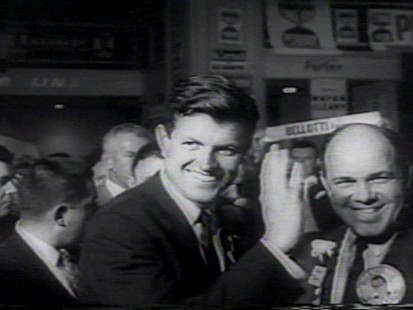« The Economist on Rod Blagojevich: "Can I get a witness?" | Main | Making plays: Point guard Bernanke on 1.6% "crawl" in Q2 »
August 26, 2010
Ted Kennedy
Ted Kennedy died on August 25th last year; the following is our post on the day after:
Nearly everyone I am close to lives in a time zone ahead of mine. Except my friend Ellen who called me about 11:15 PT last night and told me. Even with a fifteen months' "heads up" about Ted Kennedy having brain cancer, I was stunned that Kennedy--the only one of Joe Kennedy Sr.'s four boys to not die violently and young--had died. So this did hit me. My first vote for a Republican presidential candidate ever last November--John McCain--was not the sea change in my ideas, instincts or emotions I had thought. I don't expect anyone under 45 or so to understand. Below is exactly what we wrote last year, on May 22, 2008, in this post, the day after it was disclosed that Kennedy was ill:
To be Irish is to know that, in the end, the world will break your heart.
--Daniel Patrick Moynihan
Call me a cultural stereotype. A boomer. A limousine liberal. I don't care. Ted Kennedy being diagnosed with malignant cancer of the brain floored me. I don't even know why. Long ago, Duke University, which changed my life in a number of ways, awarded me my first paid desk job to work for Wisconsin's Senator Gaylord Nelson. With some help from my father, I rented an overpriced and horrible little apartment across the street from the hospital on Washington Circle where I had been born 21 years earlier, and excitedly entered the world I'd been seeing on television since I was in my early teens growing up in the Midwest. That first sunny Monday morning in May, I walked all the way to work, zig-zagging down Pennsylvania Avenue, and then up Constitution Avenue, well over two miles total, just to take it all in.
But I walked in a hurry.

Edward Moore Kennedy (1932-2009)
The Hill job was in health policy, and I was asked to follow and report on the work of the busy U.S. Senate Subcommittee on Health, chaired by then 42-year-old Ted Kennedy. I saw Kennedy up close a lot during committee sessions and mark-ups during the next 3 months. (A few years later, I worked again on Capitol Hill, and lived there for many years. I'd see him around. Today, if I were lucky, he might recognize my persistent face if he saw me--but I certainly wasn't important those first 3 months.) But way before that, as the "last Kennedy", he was always part of the soundtrack of my life and my friends' lives since we were in our early teens. But he was more than a name, mystique and the booming populist oratory and Gaelic cadences of speech which come naturally to him.
For me, Ted Kennedy has never been about ideas, legislative agendas or even the Kennedy schmaltz: the hope, the dream that never dies, the struggle, all that. He left that music to others, like to his uber-aggressive brother-in-law, Steven Smith, and to his staff. I just never saw Kennedy as an ideologue, even when he ran for the American presidency--which I bet he never really wanted. A character out of a novel, he's simply as Irish as they come: brooding, playful and contradictory. Quietly but definitely war-like. He's smarter than people think, and remarkably adept at sifting through and making sense of too much information thrown at him.
In the main, though, he's passionate, human, even poetic--and vulnerable in all the best ways.
Like lots of senators, he's also distracted as hell, even endearingly spacey--but warm and charming, a natural politician, easily the best in his family. He can turn that on and off. Like Bill Clinton, and for whatever the reason, Kennedy genuinely likes people; it's not for show. Watch the guy in a crowd. He's at ease once he's there. He physically resembles most, and is most like, his mother Rose, the family saint and caregiver. And that soulfulness, I think, helped him to be very good at his job. Family friend and economist John Kenneth Galbraith once said that Ted Kennedy was the best U.S. senator he'd seen in his lifetime.
Finally, the last Kennedy is as wounded as they come, too. Try, if you can, not to cry when you watch a clip of his eulogy of his brother Robert in 1968, when he was 36. Kennedy's voice cracked badly, and I can't forget the sound of him as he struggled to finish the speech for his older brother. It wasn't about politics, ideas, or even about anyone's family. The sound was pure grief and loss, unashamed.
See in New York Times "Edward Kennedy, Senate Stalwart, Dies".
Posted by JD Hull at August 26, 2010 11:59 PM
Comments
Post a comment
Thanks for signing in, . Now you can comment. (sign out)
(If you haven't left a comment here before, you may need to be approved by the site owner before your comment will appear. Until then, it won't appear on the entry. Thanks for waiting.)